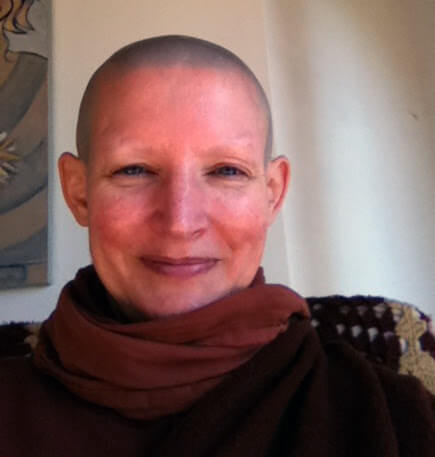
I will never forget the first time I experienced the presence of the Ven Ayya Tathaaloka. She walked into a Advanced Practitioner Program retreat at Spirit Rock that I attended, and she literally lit up the meditation hall. Before she uttered a word, her luminous presence said everything.
She proceeded to share the bima (teaching platform) with renowned Theravadan scholar, Bhikkhu Bodhi, to discuss and field questions on the topic of the Abhidhamma, a vast map of the Buddhist view of the mind and how it relates to the world. Not only was Ayya T’s pure presence remarkable, she easily held her own as a brilliant scholar. She was both inspiring and impressive.
As they opened up to other questions, I found my hand cautiously rising up. At that time ten years ago, there was great division in Buddhist circles about the teaching of secular mindfulness. As an InsightLA teacher teaching these classes, such as Mindfulness-Based Stress Reduction (MBSR) & Mindful Self-Compassion (MSC), I could think of no higher authority to consult than the two esteemed monastics sitting before me.
Summoning the courage, I inquired, “Are these secular classes wholesome and do you support them as a legitimate part of the Buddhist path?” I will never forget Ayya T’s gentle and radically simple reply, “Is there the alleviation of suffering?” I nodded. Then, she added, “Is there understanding and fidelity to the original teachings of the Buddha?” I nodded again. Bhikku Bodhi concurred. In that moment, all debate ended.
As the founding Abbess of Dhammadharini Vihara, a monastic retreat for women in Northern California, Ayya T has bravely and skillfully gone about supporting the growth of the Bhikkhuni Sangha today. I support her work and the light of her embodied presence guides my path.
With Love, Lisa Kring
